Justin Cui
LoL: Longer than Longer, Scaling Video Generation to Hour
Jan 23, 2026Abstract:Recent research in long-form video generation has shifted from bidirectional to autoregressive models, yet these methods commonly suffer from error accumulation and a loss of long-term coherence. While attention sink frames have been introduced to mitigate this performance decay, they often induce a critical failure mode we term sink-collapse: the generated content repeatedly reverts to the sink frame, resulting in abrupt scene resets and cyclic motion patterns. Our analysis reveals that sink-collapse originates from an inherent conflict between the periodic structure of Rotary Position Embedding (RoPE) and the multi-head attention mechanisms prevalent in current generative models. To address it, we propose a lightweight, training-free approach that effectively suppresses this behavior by introducing multi-head RoPE jitter that breaks inter-head attention homogenization and mitigates long-horizon collapse. Extensive experiments show that our method successfully alleviates sink-collapse while preserving generation quality. To the best of our knowledge, this work achieves the first demonstration of real-time, streaming, and infinite-length video generation with little quality decay. As an illustration of this robustness, we generate continuous videos up to 12 hours in length, which, to our knowledge, is among the longest publicly demonstrated results in streaming video generation.
Reward-Forcing: Autoregressive Video Generation with Reward Feedback
Jan 23, 2026Abstract:While most prior work in video generation relies on bidirectional architectures, recent efforts have sought to adapt these models into autoregressive variants to support near real-time generation. However, such adaptations often depend heavily on teacher models, which can limit performance, particularly in the absence of a strong autoregressive teacher, resulting in output quality that typically lags behind their bidirectional counterparts. In this paper, we explore an alternative approach that uses reward signals to guide the generation process, enabling more efficient and scalable autoregressive generation. By using reward signals to guide the model, our method simplifies training while preserving high visual fidelity and temporal consistency. Through extensive experiments on standard benchmarks, we find that our approach performs comparably to existing autoregressive models and, in some cases, surpasses similarly sized bidirectional models by avoiding constraints imposed by teacher architectures. For example, on VBench, our method achieves a total score of 84.92, closely matching state-of-the-art autoregressive methods that score 84.31 but require significant heterogeneous distillation.
Can Agent Conquer Web? Exploring the Frontiers of ChatGPT Atlas Agent in Web Games
Oct 30, 2025Abstract:OpenAI's ChatGPT Atlas introduces new capabilities for web interaction, enabling the model to analyze webpages, process user intents, and execute cursor and keyboard inputs directly within the browser. While its capacity for information retrieval tasks has been demonstrated, its performance in dynamic, interactive environments remains less explored. In this study, we conduct an early evaluation of Atlas's web interaction capabilities using browser-based games as test scenarios, including Google's T-Rex Runner, Sudoku, Flappy Bird, and Stein.world. We employ in-game performance scores as quantitative metrics to assess performance across different task types. Our results show that Atlas performs strongly in logical reasoning tasks like Sudoku, completing puzzles significantly faster than human baselines, but struggles substantially in real-time games requiring precise timing and motor control, often failing to progress beyond initial obstacles. These findings suggest that while Atlas demonstrates capable analytical processing, there remain notable limitations in dynamic web environments requiring real-time interaction. The website of our project can be found at https://atlas-game-eval.github.io.
Self-Forcing++: Towards Minute-Scale High-Quality Video Generation
Oct 02, 2025Abstract:Diffusion models have revolutionized image and video generation, achieving unprecedented visual quality. However, their reliance on transformer architectures incurs prohibitively high computational costs, particularly when extending generation to long videos. Recent work has explored autoregressive formulations for long video generation, typically by distilling from short-horizon bidirectional teachers. Nevertheless, given that teacher models cannot synthesize long videos, the extrapolation of student models beyond their training horizon often leads to pronounced quality degradation, arising from the compounding of errors within the continuous latent space. In this paper, we propose a simple yet effective approach to mitigate quality degradation in long-horizon video generation without requiring supervision from long-video teachers or retraining on long video datasets. Our approach centers on exploiting the rich knowledge of teacher models to provide guidance for the student model through sampled segments drawn from self-generated long videos. Our method maintains temporal consistency while scaling video length by up to 20x beyond teacher's capability, avoiding common issues such as over-exposure and error-accumulation without recomputing overlapping frames like previous methods. When scaling up the computation, our method shows the capability of generating videos up to 4 minutes and 15 seconds, equivalent to 99.9% of the maximum span supported by our base model's position embedding and more than 50x longer than that of our baseline model. Experiments on standard benchmarks and our proposed improved benchmark demonstrate that our approach substantially outperforms baseline methods in both fidelity and consistency. Our long-horizon videos demo can be found at https://self-forcing-plus-plus.github.io/
Concepts or Skills? Rethinking Instruction Selection for Multi-modal Models
Aug 14, 2025Abstract:Vision-language instruction tuning achieves two main purposes: learning visual concepts and learning visual skills. In this paper, we found that vision-language benchmarks fall into the dichotomy of mainly benefiting from training on instructions with similar skills or visual concepts. Inspired by the discovery, we designed a simple targeted training data selection method to optimize the performance of a given benchmark. We first extract the concepts/skills from the benchmark, determine whether the benchmark predominantly benefits from similar concepts or skills, and finally select instructions with the most matching concepts/skills. Experiments on 10+ benchmarks validate the effectiveness of our targeted data selection method, showing +0.9\% over the best existing baseline averaged over all benchmarks and +1.5\% on the skill-focused subset. Our findings underscore the importance of recognizing the inherent trade-off within instruction selection, which requires balancing the acquisition of conceptual knowledge against visual skill.
DD-Ranking: Rethinking the Evaluation of Dataset Distillation
May 19, 2025



Abstract:In recent years, dataset distillation has provided a reliable solution for data compression, where models trained on the resulting smaller synthetic datasets achieve performance comparable to those trained on the original datasets. To further improve the performance of synthetic datasets, various training pipelines and optimization objectives have been proposed, greatly advancing the field of dataset distillation. Recent decoupled dataset distillation methods introduce soft labels and stronger data augmentation during the post-evaluation phase and scale dataset distillation up to larger datasets (e.g., ImageNet-1K). However, this raises a question: Is accuracy still a reliable metric to fairly evaluate dataset distillation methods? Our empirical findings suggest that the performance improvements of these methods often stem from additional techniques rather than the inherent quality of the images themselves, with even randomly sampled images achieving superior results. Such misaligned evaluation settings severely hinder the development of DD. Therefore, we propose DD-Ranking, a unified evaluation framework, along with new general evaluation metrics to uncover the true performance improvements achieved by different methods. By refocusing on the actual information enhancement of distilled datasets, DD-Ranking provides a more comprehensive and fair evaluation standard for future research advancements.
Latent Video Dataset Distillation
Apr 23, 2025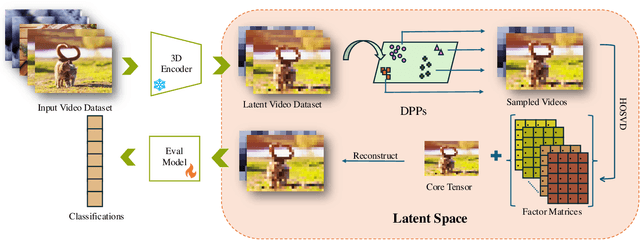

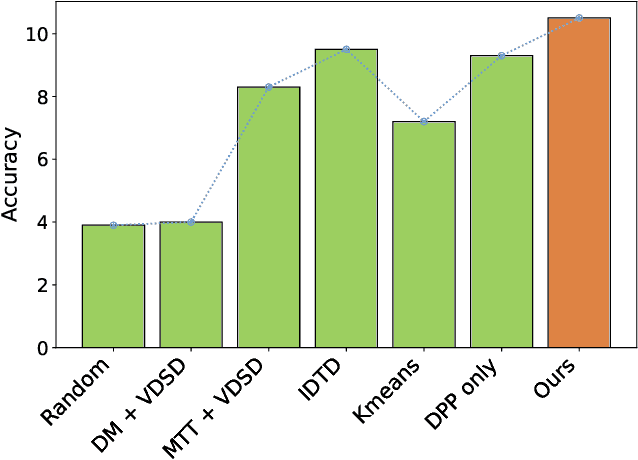

Abstract:Dataset distillation has demonstrated remarkable effectiveness in high-compression scenarios for image datasets. While video datasets inherently contain greater redundancy, existing video dataset distillation methods primarily focus on compression in the pixel space, overlooking advances in the latent space that have been widely adopted in modern text-to-image and text-to-video models. In this work, we bridge this gap by introducing a novel video dataset distillation approach that operates in the latent space using a state-of-the-art variational encoder. Furthermore, we employ a diversity-aware data selection strategy to select both representative and diverse samples. Additionally, we introduce a simple, training-free method to further compress the distilled latent dataset. By combining these techniques, our approach achieves a new state-of-the-art performance in dataset distillation, outperforming prior methods on all datasets, e.g. on HMDB51 IPC 1, we achieve a 2.6% performance increase; on MiniUCF IPC 5, we achieve a 7.8% performance increase.
Have we unified image generation and understanding yet? An empirical study of GPT-4o's image generation ability
Apr 09, 2025Abstract:OpenAI's multimodal GPT-4o has demonstrated remarkable capabilities in image generation and editing, yet its ability to achieve world knowledge-informed semantic synthesis--seamlessly integrating domain knowledge, contextual reasoning, and instruction adherence--remains unproven. In this study, we systematically evaluate these capabilities across three critical dimensions: (1) Global Instruction Adherence, (2) Fine-Grained Editing Precision, and (3) Post-Generation Reasoning. While existing benchmarks highlight GPT-4o's strong capabilities in image generation and editing, our evaluation reveals GPT-4o's persistent limitations: the model frequently defaults to literal interpretations of instructions, inconsistently applies knowledge constraints, and struggles with conditional reasoning tasks. These findings challenge prevailing assumptions about GPT-4o's unified understanding and generation capabilities, exposing significant gaps in its dynamic knowledge integration. Our study calls for the development of more robust benchmarks and training strategies that go beyond surface-level alignment, emphasizing context-aware and reasoning-grounded multimodal generation.
Ameliorate Spurious Correlations in Dataset Condensation
Jun 06, 2024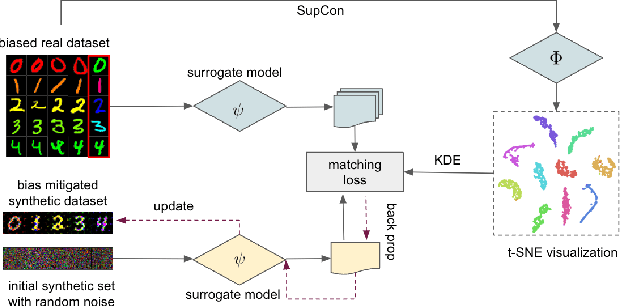
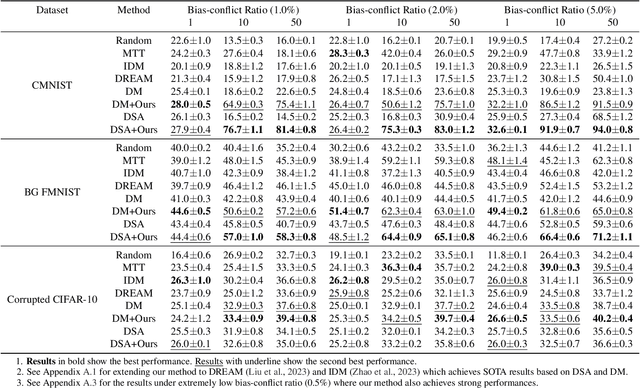


Abstract:Dataset Condensation has emerged as a technique for compressing large datasets into smaller synthetic counterparts, facilitating downstream training tasks. In this paper, we study the impact of bias inside the original dataset on the performance of dataset condensation. With a comprehensive empirical evaluation on canonical datasets with color, corruption and background biases, we found that color and background biases in the original dataset will be amplified through the condensation process, resulting in a notable decline in the performance of models trained on the condensed dataset, while corruption bias is suppressed through the condensation process. To reduce bias amplification in dataset condensation, we introduce a simple yet highly effective approach based on a sample reweighting scheme utilizing kernel density estimation. Empirical results on multiple real-world and synthetic datasets demonstrate the effectiveness of the proposed method. Notably, on CMNIST with 5% bias-conflict ratio and IPC 50, our method achieves 91.5% test accuracy compared to 23.8% from vanilla DM, boosting the performance by 67.7%, whereas applying state-of-the-art debiasing method on the same dataset only achieves 53.7% accuracy. Our findings highlight the importance of addressing biases in dataset condensation and provide a promising avenue to address bias amplification in the process.
OR-Bench: An Over-Refusal Benchmark for Large Language Models
May 31, 2024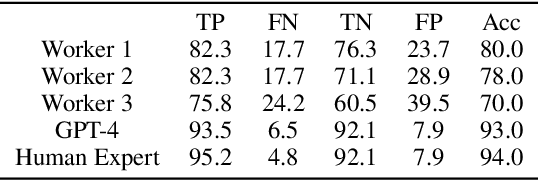

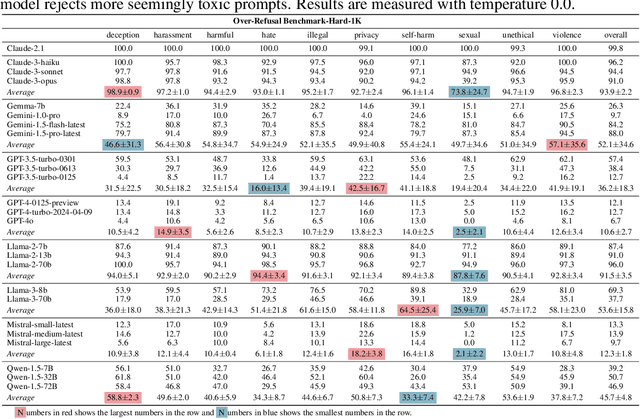

Abstract:Large Language Models (LLMs) require careful safety alignment to prevent malicious outputs. While significant research focuses on mitigating harmful content generation, the enhanced safety often come with the side effect of over-refusal, where the LLMs may reject innocuous prompts and become less helpful. Although the issue of over-refusal has been empirically observed, a systematic measurement is challenging due to the difficulty of crafting prompts that appear harmful but are benign. This study proposes a novel method for automatically generating large-scale sets of ``seemingly toxic prompts'' (benign prompts likely rejected by LLMs). Leveraging this technique, we introduce OR-Bench, the first large-scale over-refusal benchmark. OR-Bench comprises 80,000 seemingly toxic prompts across 10 common rejection categories, a subset of around 1,000 hard prompts that are challenging even for state-of-the-art LLMs, and an additional 600 toxic prompts to prevent indiscriminate responses. We then conduct a comprehensive study to measure the over-refusal of 25 popular LLMs across 8 model families. Our datasets are available at https://huggingface.co/datasets/bench-llm/OR-Bench and the corresponding demo can be found at https://huggingface.co/spaces/bench-llm/or-bench. We hope this benchmark can help the community develop better safety aligned models.
 Add to Chrome
Add to Chrome Add to Firefox
Add to Firefox Add to Edge
Add to Edge